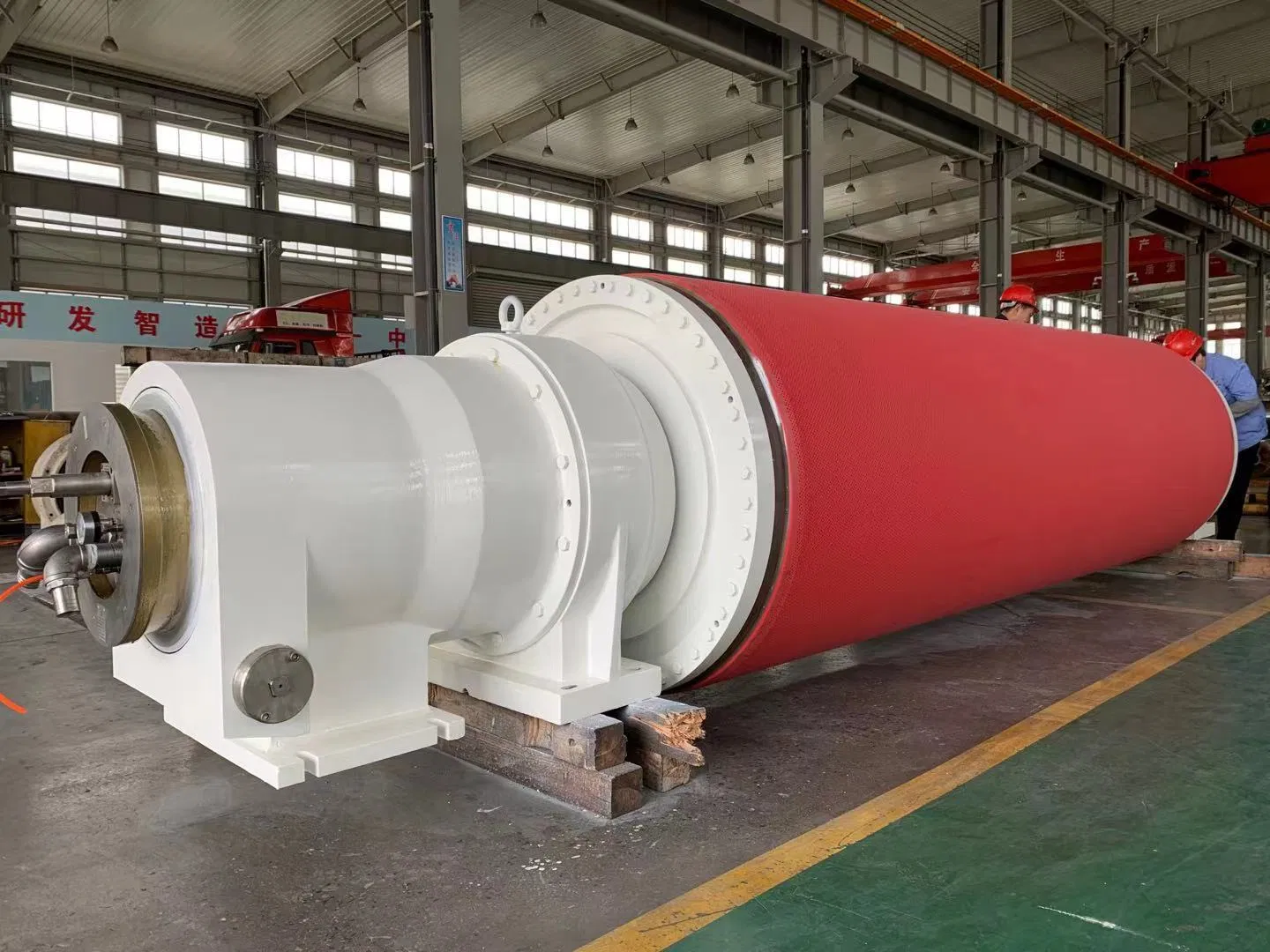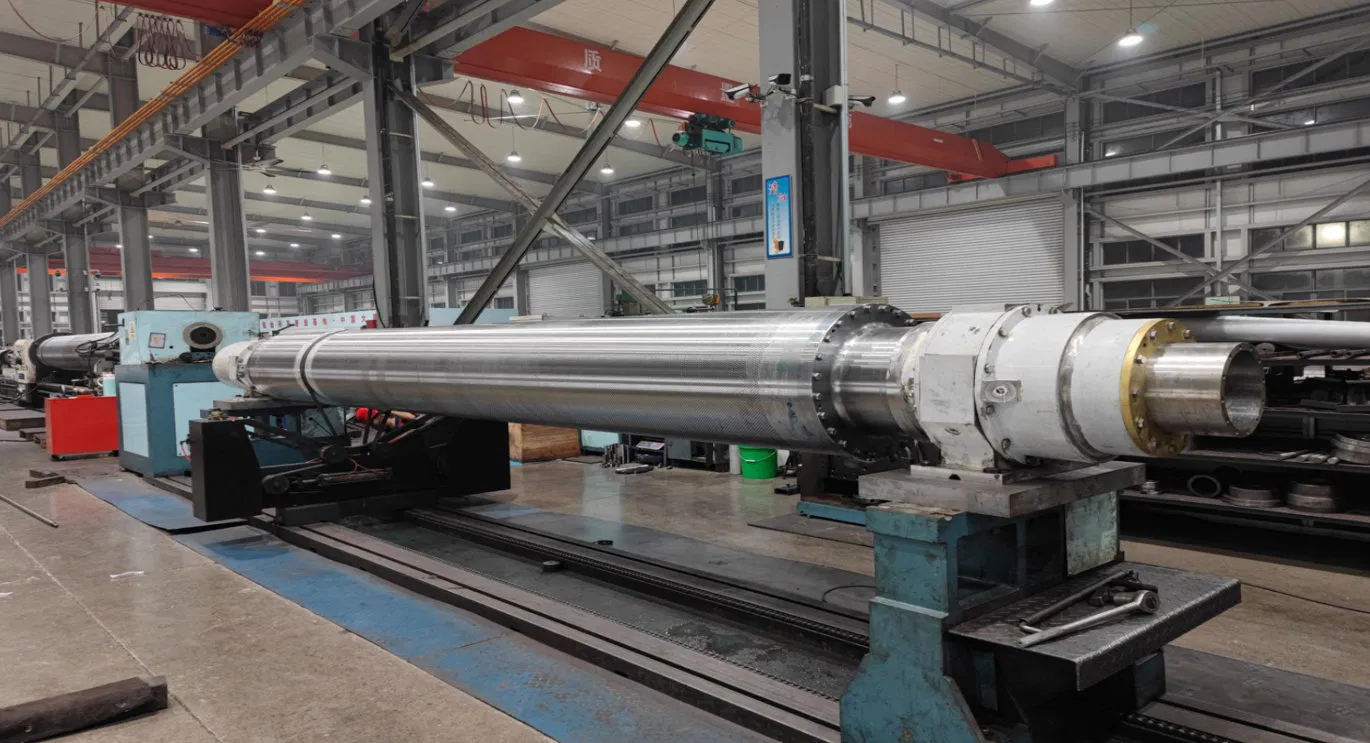Frankly speaking, in the intricate world of paper manufacturing, there are countless components working in harmony to produce the sheets we use every day. Yet, few are as fundamentally critical, or as often overlooked, as the rolls within a paper machine. These aren't just simple cylinders; they are precision-engineered marvels, each designed for a specific task, from dewatering and pressing to drying and calendering. The performance of these rolls directly impacts everything from paper quality and machine uptime to energy consumption and operational costs. This is precisely why the choice of your paper machine roll supplier is not just a procurement decision, but a strategic partnership that can define your mill's success.
Have you ever wondered about the sheer scale and complexity involved in transforming wood pulp into a finished roll of paper? It's a fascinating journey, and at every critical juncture, specialized rolls play a pivotal role. From the moment the pulp slurry enters the forming section to the final winding of the paper, these rolls are under immense stress, dealing with high temperatures, pressures, and corrosive environments. Their durability, precision, and surface integrity are paramount. In my experience, a mill's efficiency can often be traced back to the quality and maintenance of its rolls, and by extension, the reliability of its paper machine roll supplier.
The Unsung Heroes: Understanding Paper Machine Rolls and Their Functions
To truly appreciate the value a top-tier paper machine roll supplier brings, it's essential to understand the diverse roles these rolls play. Each section of a paper machine utilizes different types of rolls, each with unique design specifications, materials, and surface coatings tailored to its function. It's worth noting that even a microscopic imperfection on a roll's surface can lead to significant defects in the final paper product, impacting quality and increasing waste.
Different Types of Rolls and Their Critical Functions
- Breast Rolls: Located at the beginning of the forming section, these rolls support the forming fabric and help distribute the pulp slurry evenly. Their precision is crucial for initial sheet formation.
- Suction Rolls: Found in the press section, these rolls use vacuum to remove water from the paper web, significantly reducing the energy required for subsequent drying. They are complex, featuring thousands of precisely drilled holes.
- Press Rolls: These rolls, often covered with specialized rubber or composite materials, work in pairs to mechanically squeeze water out of the paper web. The pressure applied must be uniform across the entire width to prevent crushing or uneven dewatering.
- Dryer Rolls (Yankee Dryers): Massive, heated cylinders that evaporate the remaining water from the paper. Surface finish and temperature uniformity are critical here to ensure consistent drying and prevent sticking.
- Calender Rolls: Used in the finishing section, these highly polished rolls impart smoothness, gloss, and uniform thickness to the paper. They operate under high pressure and temperature, demanding extreme precision and hardness.
- Guide Rolls and Spreader Rolls: These rolls ensure the paper web tracks correctly through the machine, preventing wrinkles, tears, and misalignment.
Each of these rolls represents a significant investment, and their operational lifespan is directly tied to their initial quality and subsequent maintenance. This is where the expertise of a specialized paper machine roll supplier becomes indispensable. They don't just provide parts; they provide engineered solutions designed for longevity and peak performance.

The Pivotal Role of a Premier Paper Machine Roll Supplier
A truly excellent paper machine roll supplier is far more than a vendor; they are a strategic partner. Their role extends beyond merely manufacturing and delivering rolls. They bring a wealth of knowledge in material science, engineering, and paper-making processes, offering solutions that optimize your entire operation. To be honest, the complexity of modern paper machines means that off-the-shelf solutions are rarely sufficient. Customization and a deep understanding of specific mill needs are paramount.
Customization and Engineering Excellence
One of the hallmarks of a leading paper machine roll supplier is their ability to provide custom paper machine rolls. This isn't just about size; it involves tailoring materials, coatings, and internal designs to meet specific operational demands, such as high-speed production, resistance to abrasive chemicals, or enhanced dewatering capabilities. They leverage advanced CAD/CAM systems and simulation software to design rolls that perform optimally under the exact conditions of your mill, minimizing wear and maximizing efficiency. This level of bespoke engineering is crucial for mills looking to push the boundaries of productivity and quality.
Material Science and Coatings: The Secret Sauce
The performance of a roll is heavily dependent on its material composition and surface treatment. A reputable industrial roll manufacturing expert will have extensive knowledge of various metals, composites, and polymers, understanding how each reacts to heat, pressure, and chemical exposure. Furthermore, they specialize in applying advanced coatings—from hard chrome and ceramics to specialized polymers—that enhance wear resistance, improve release properties, and extend roll life. These coatings are not just applied; they are meticulously engineered to bond with the roll's substrate, ensuring durability and consistent performance over time. Interestingly enough, breakthroughs in nanotechnology are even leading to new generations of roll coatings that offer unprecedented levels of friction reduction and corrosion resistance.
Navigating the Selection Process: What to Look for in a Supplier
Choosing the right paper machine roll supplier is a decision that will impact your mill's profitability for years to come. It requires careful consideration of several key factors beyond just the initial purchase price. Many experts agree that focusing solely on cost can lead to significant long-term expenses due to premature wear, increased downtime, and compromised paper quality.
Key Qualities of a Top-Tier Supplier
- Quality Assurance and Certifications: Look for suppliers with rigorous quality control processes and relevant industry certifications (e.g., ISO standards). This indicates a commitment to consistent, high-quality products.
- Technological Capabilities: A leading supplier invests in cutting-edge technology for manufacturing, balancing, and testing. Ask about their dynamic balancing capabilities, precision grinding equipment, and non-destructive testing methods. The precision of their industrial roll manufacturing processes directly translates to the performance and longevity of the rolls.
- After-Sales Service and Support: This is where a true partnership shines. Does the supplier offer comprehensive maintenance programs, roll repair services, and emergency support? Proactive paper mill equipment maintenance and timely repairs can significantly extend the life of your rolls and prevent costly unscheduled shutdowns.
- Experience and Reputation: How long have they been in business? What is their track record with other mills? Reputable suppliers often have a long history of successful collaborations and positive testimonials.
- Research and Development: A forward-thinking supplier is continuously innovating, developing new materials, coatings, and designs to meet the evolving demands of the paper industry. This ensures you have access to the latest advancements.
- Global Reach vs. Local Support: Depending on your mill's location, consider whether a supplier offers localized support, which can be crucial for rapid response times for repairs or emergency replacements.

Innovations Driving the Future of Paper Production
The paper industry is constantly evolving, driven by demands for higher efficiency, better quality, and increased sustainability. The role of the paper machine roll supplier is crucial in this evolution, as they are at the forefront of developing new technologies that enable these advancements. In my experience, the pace of innovation in roll technology is surprisingly rapid, often overlooked by those outside the immediate field.
Emerging Trends in Roll Technology
- Advanced Composite Materials: Beyond traditional steel and cast iron, new composite materials are being developed that offer superior strength-to-weight ratios, better corrosion resistance, and enhanced vibration damping, leading to smoother operation and longer roll life.
- Smart Rolls with Integrated Sensors: Imagine rolls that can monitor their own temperature, vibration, and even surface wear in real-time. This isn't science fiction; smart rolls equipped with embedded sensors are becoming a reality, providing invaluable data for predictive maintenance and optimizing operational parameters. This allows for proactive paper mill equipment maintenance, preventing failures before they occur.
- Environmentally Friendly Coatings: With increasing pressure for sustainable manufacturing, suppliers are developing coatings that are not only high-performing but also environmentally benign, reducing the use of hazardous materials and minimizing waste.
- Enhanced Surface Texturing: Precision laser etching and other advanced techniques are being used to create highly specific surface textures on rolls, optimizing water removal, improving sheet release, and enhancing paper properties. This level of customization is a testament to the sophistication of modern industrial roll manufacturing.
These innovations highlight why partnering with a supplier committed to R&D is so vital. They ensure your mill remains competitive, leveraging the latest technology to improve efficiency, reduce costs, and produce superior paper products. The ability to provide custom paper machine rolls that integrate these cutting-edge features is a significant differentiator.
The Economic and Operational Impact of Superior Rolls
Ultimately, the quality of your paper machine rolls, and by extension, the reliability of your paper machine roll supplier, has a direct and measurable impact on your mill's bottom line. The initial investment in high-quality rolls might seem significant, but the long-term benefits far outweigh the upfront cost, preventing a cascade of operational issues.
Quantifiable Benefits of High-Quality Rolls
- Increased Uptime: Fewer roll failures mean less unscheduled downtime, which is incredibly costly in a continuous process like paper manufacturing. Every hour of downtime translates to lost production and revenue.
- Improved Paper Quality: Precision-engineered rolls with optimal surface finishes ensure uniform paper properties, reducing defects, improving printability, and enhancing the overall market value of your product.
- Reduced Energy Consumption: Efficient dewatering in the press section, facilitated by well-maintained and optimally designed rolls, significantly reduces the energy required in the dryer section, leading to substantial energy savings.
- Extended Service Life: High-quality materials and advanced coatings mean rolls last longer, reducing the frequency of replacements and the associated costs of purchase, installation, and disposal. This also ties into effective paper mill equipment maintenance strategies.
- Lower Maintenance Costs: Durable rolls require less frequent grinding, re-coating, and repair, leading to lower maintenance labor and material costs over time.
Frankly speaking, the ripple effect of a single roll failure can be catastrophic, leading to extensive damage to other machine components, prolonged shutdowns, and significant financial losses. This underscores the importance of not just buying rolls, but investing in a partnership with a supplier who understands the nuances of your operation and can provide solutions that truly contribute to your mill's efficiency and profitability.
Forging a Partnership for Success
In conclusion, the role of a paper machine roll supplier is far more profound than simply delivering components. They are integral to the operational efficiency, product quality, and long-term profitability of any paper mill. From the initial design and material selection to ongoing maintenance and innovative solutions, a top-tier supplier acts as a crucial partner, helping mills navigate the complexities of modern paper production.
Choosing the right partner means looking beyond price tags and focusing on expertise, technological capabilities, commitment to quality, and comprehensive after-sales support. It means seeking out a supplier who understands the unique challenges of your operation and can provide custom paper machine rolls that are not just parts, but engineered solutions. By forging such a strategic alliance, paper mills can ensure their operations run smoothly, efficiently, and profitably, securing their position in a competitive global market. The backbone of your paper machine deserves nothing less than the best.
For more detailed information, please visit our official website:Paper machine roll supplier
About the author: Dr. Evelyn Reed is a recognized authority in industrial machinery and materials science, with over two decades of experience specializing in the pulp and paper industry. Her work focuses on optimizing manufacturing processes through advanced component design and predictive maintenance strategies. Evelyn frequently consults with leading paper mills worldwide, sharing insights on how strategic partnerships with suppliers can revolutionize operational efficiency and product quality.


